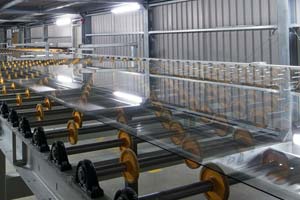Float Glass Process
Float glass is a sheet of glass made by floating molten glass on a bed of molten metal, typically tin. This method gives the sheet uniform thickness and very flat surfaces. Once off the bath, the glass sheet passes through a lehr kiln, where it is cooled gradually, so that it anneals without strain and does not crack from the temperature change.
- At a Glance
- Featured Solutions
Application Need
Temperature monitoring in the annealing section of a float glass lehr is critical. Incorrect annealing temperatures or rapid temperature changes cause uneven expansion and contraction, setting up improper stresses in the glass, which affects quality and cutability.
Benefits to the customer
- Traceability of multiple zone annealing temperatures
- Reduced scrap by achieving proper temperature profile across ribbon
- Improved glass quality (warping, cutability)
- Improved profitability of the float glass machine
Other featured products
Get more information about Fluke Process Instruments solutions for this application





